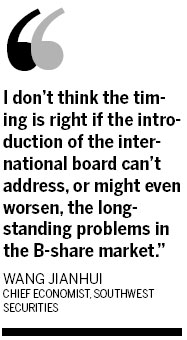Concerns over international board

Shanghai's long-awaited international trading board has come under intense scrutiny after a flurry of recent media reports that China's regulator has selected 10 foreign and overseas companies to offer yuan-denominated shares for sale to domestic investors.
While the new development has thrilled many investors at a time when the Chinese bourses are in the doldrums, analysts have remained skeptical. They pointed to potential problems in share price evaluation, unpredictable capital flow and supervisory issues. What's more, the international board, as proposed, could render the B-share market redundant.
B Shares - foreign-invested shares issued domestically by Chinese companies and subscribed and traded in foreign currencies - have been mired in low volume trading for years.
"If handled improperly, the board could prove a drag rather than a boon to Shanghai's financial market," said Wang Jianhui, chief economist with Southwest Securities.
Preparations for the board, which Shanghai sees as an essential component in its ambition to become an international financial center by 2020, have been taking place over the past two years. Shanghai's Deputy Mayor, Tu Guangshao, who is responsible for finance, said in February that the board could be launched this year.
On April 22, the 21st Century Business Herald reported that regulators will allow a first batch of 10 foreign and overseas-listed Chinese companies to list on the board, citing a draft plan.
According to the proposed rules, a company seeking a listing on the board must have a market capitalization of more than 30 billion yuan ($5.5 billion) and a combined three-year net income of more than 3 billion yuan. In addition, the proceeds of the initial public offering can only be used abroad.
So far, many foreign companies, including HSBC Holdings Plc, Standard Chartered Plc and Bank of East Asia Co, have shown an interest in filing for a listing on the board.
"I don't think the timing is right if the introduction of the international board can't address, or might even worsen, the long-standing problems in the B-share market." said Wang.
"The international board actually threatens to further marginalize the B-share market, which is already plagued by low-trading."
 0
0 






